Alzheimer's disease, a progressive neurological disorder that affects memory, thinking, and behavior, remains one of the most significant medical challenges of our time. It predominantly affects older adults and is the most common cause of dementia worldwide. While there is currently no cure for Alzheimer's, significant progress has been made in understanding the disease and developing treatments to manage its symptoms and potentially slow its progression. Here’s a comprehensive look at Alzheimer’s treatment, focusing on current methods, challenges, and future possibilities.
Understanding Alzheimer's Disease
Alzheimer's disease is characterized by the buildup of amyloid plaques and tau tangles in the brain, leading to the loss of neurons and their connections. This neurodegeneration gradually affects memory, cognitive function, and the ability to carry out daily tasks. Over time, individuals with Alzheimer's may lose their ability to communicate, recognize loved ones, or maintain independence.
Goals of Alzheimer's Treatment
The primary goals of Alzheimer’s treatment are:
Symptom Management: Address cognitive symptoms such as memory loss, confusion, and behavioral issues like agitation or depression.
Slowing Disease Progression: Target the underlying biological mechanisms of Alzheimer's to slow the advancement of the disease.
Enhancing Quality of Life: Help patients maintain independence and quality of life for as long as possible.
Current Treatments for Alzheimer's Disease
Medications for Cognitive Symptoms
a. Cholinesterase Inhibitors: These drugs increase levels of acetylcholine, a neurotransmitter involved in memory and learning. Common examples include Donepezil (Aricept), Rivastigmine (Exelon), and Galantamine (Razadyne). These medications are primarily used for mild to moderate Alzheimer's.
b. Memantine (Namenda): This medication regulates the activity of glutamate, another important neurotransmitter, and is used to treat moderate to severe Alzheimer's. It may help with cognitive function and daily activities.
Medications for Behavioral and Psychological Symptoms
a. Antidepressants: Depression is common in individuals with Alzheimer's. Antidepressants such as SSRIs (Selective Serotonin Reuptake Inhibitors) may help alleviate these symptoms.
b. Antipsychotics: In cases of severe agitation, aggression, or hallucinations, antipsychotic medications like risperidone or quetiapine may be prescribed. However, these come with significant side effects and are used cautiously.
c. Anti-anxiety Medications: Benzodiazepines or similar medications may be used for short-term management of anxiety or restlessness, but long-term use is generally avoided due to risks such as increased confusion or falls.
Disease-Modifying Therapies
Aducanumab (Aduhelm): Approved by the FDA in 2021, Aducanumab is the first drug to target and reduce amyloid plaques in the brain. This drug offers hope of slowing disease progression, but its efficacy and safety remain subjects of ongoing debate within the medical community.

Lecanemab (Leqembi): A newer FDA-approved monoclonal antibody, Lecanemab also targets amyloid plaques and has shown potential in slowing cognitive decline in early-stage Alzheimer's patients. This drug represents a promising step forward in disease-modifying therapies.
Lifestyle and Non-Pharmacological Interventions
While medications are essential, lifestyle interventions play a critical role in managing Alzheimer's. These include:
Cognitive Training: Brain exercises and cognitive rehabilitation techniques may help to slow memory decline and improve problem-solving skills.
Physical Activity: Regular exercise can benefit brain health by increasing blood flow and potentially slowing neurodegeneration.
Social Engagement: Staying socially active can help maintain cognitive function and improve mood.
Diet: A healthy diet, particularly one rich in antioxidants and omega-3 fatty acids, such as the Mediterranean diet, may have neuroprotective effects.
Supportive Therapies
Occupational Therapy: Helps patients adapt to changes in cognitive function, ensuring they can continue performing daily activities as independently as possible.
Speech Therapy: Addresses communication difficulties, especially in later stages of the disease.
Music and Art Therapy: These therapeutic approaches have been shown to help with emotional regulation and improve overall well-being.
Challenges in Alzheimer’s Treatment
Lack of a Cure: Despite advances in treatment, there is no cure for Alzheimer's. Current treatments focus on symptom management and slowing progression rather than halting or reversing the disease.
Early Diagnosis: Many treatments, especially disease-modifying drugs, are most effective in the early stages of Alzheimer's. However, diagnosis often occurs later, when significant brain damage has already occurred.
Side Effects of Medications: The medications used to treat Alzheimer's symptoms often come with side effects, such as nausea, dizziness, or an increased risk of falls, particularly in older adults who may already be frail.
Cost and Accessibility: Newer treatments like Aducanumab and Lecanemab are expensive, and access to these drugs may be limited by factors such as insurance coverage and availability of healthcare providers trained to administer them.
Future Directions in Alzheimer’s Treatment
Biomarker Research: The discovery of biomarkers in blood or cerebrospinal fluid that indicate the presence of Alzheimer's years before symptoms arise is an exciting area of research. Early detection could lead to more effective treatment.
Gene Therapy and CRISPR: Advances in genetic research and gene-editing technologies like CRISPR hold promise for future treatments that could potentially alter the course of the disease at a genetic level.
Immunotherapy: Research into vaccines that train the immune system to attack amyloid plaques or tau tangles is ongoing. These therapies aim to slow or prevent the accumulation of these harmful proteins in the brain.
Stem Cell Therapy: Stem cell research offers hope for regenerating lost neurons and repairing damaged brain tissue, although this area of treatment is still in its infancy.
Combination Therapies: Future approaches may involve combining multiple therapies that target different aspects of the disease, such as amyloid reduction, tau stabilization, and neuroinflammation suppression.















